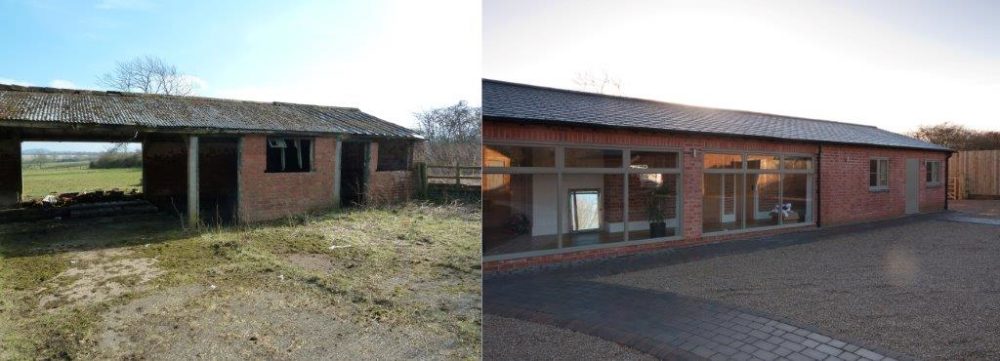
A stunning barn conversion in rural Leicestershire has been hailed as an outstanding example of the energy efficient home of the future.
The former milking shed – part of the Hall Farm Barns development on the edge of the village of Scraptoft – was converted to the highest possible specification by developer Onsen Homes in conjunction with Staniforth Architects and main contractor Brown and Green.
Harnessing the latest renewable energy technology was a key component of the scheme with leading manufacturer Stiebel Eltron UK providing installer Flogas Renewables with two WPL 20 air source heat pumps and its SOL 27 solar thermal panels.
Huge efficiencies were gained by integrating the renewable energy technologies early in the project with almost no impact on the development’s overall design.
The end result for the new owners of the two barns are homes full of character and original features, but harnessing the latest technologies to ensure minimal running costs and the opportunity to take advantage of the Government’s Domestic Renewable Heat Incentive (RHI).
The savings for the converted milking shed – some 480m2 in size – are eye-catching. The annual running cost for oil would have been £2,610, compared to £1,954 with the air source heat pumps. When combined with the solar thermal saving of £200 it makes a combined annual saving of £856.
The annual RHI payment for the heat pumps and solar thermal is a staggering £3,213, making a total annual benefit of £4,069.
Across the seven-year period of the RHI, this means an overall benefit of £28,483.
Nigel Parkes, a director of Onsen Homes, said: “From the outset, our aim was to exceed the prevailing Building Regulations and create two highly efficient barn conversions. We had to work sympathetically within the fabric while making subtle improvements that did not detract from the charm of the buildings and their setting. Renewables were key and their success on this scheme is that they were integrated from a very early stage in the design.”
In addition to the financial savings and benefits available, the total site reduces carbon by more than 13,000kg per annum.
In addition to the air source heat pumps and solar thermal, Flogas also specified PEX20 Simpleheat underfloor heating throughout insisting on low thermal resistance floor coverings so that the water heating temperature is as low as possible to satisfy the demands of the buildings.
The low temperatures enable the heat pumps to work as effectively as possible reducing the cost of energy for the owners. The combined heat pump system saves an estimated 11,195kg/CO2 per annum compared to a traditional oil-fired boiler heating system.
Meanwhile, the solar thermal contribution to the hot water is estimated to 2,300kW/hours, saving a further 358kg/CO2 per annum.
Both converted barns also include a 4kW solar PV system further reducing carbon emissions by 1,500kg per annum with most of the electricity produced being consumed by the heat pumps.
Mark McManus, Managing Director of Stiebel Eltron UK, said: “This was a remarkable project bringing derelict buildings back to life, but harnessing the most advanced and innovative renewable energy technologies available today.
“The return on investment in terms of running cost savings and the benefits available through the Domestic RHI are staggering and explains why we have seen a significant increase in orders since the scheme went live earlier this year.”
To help home owners find out more about the Domestic RHI, Stiebel Eltron UK has launched a website all about the scheme – www.myrenewableheatincentive.co.uk
